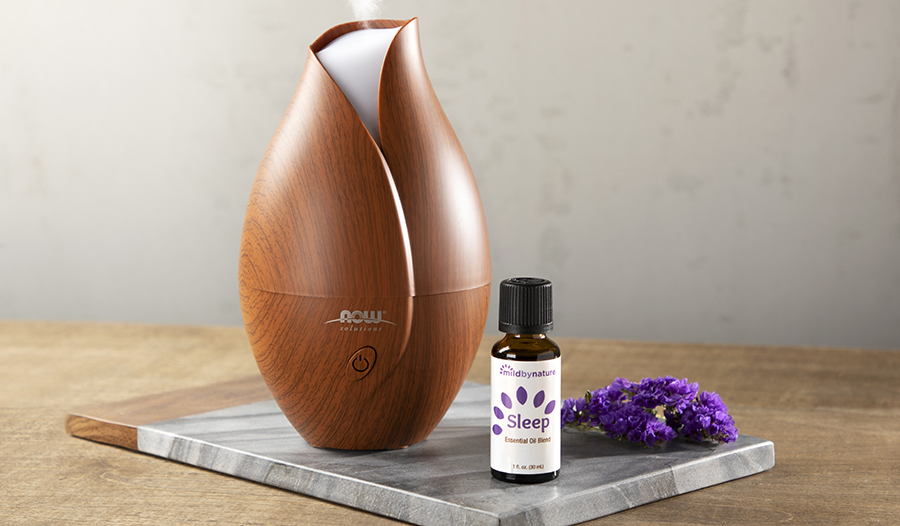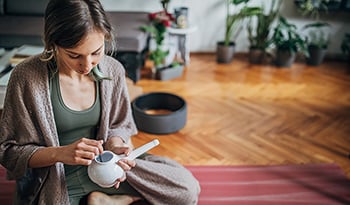A Simple 5 Step Nighttime Routine To Help Strengthen Immunity
DISCLAIMER:This blog does not intend to provide diagnosis...

We know that lack of sleep can negatively impact mood, but did you know it has the same impact on our immune health? Our immune defense peaks in strength at night, so we want to provide our bodies with optimal nocturnal rest for cellular restoration. A calming nighttime pre-sleep ritual filled with immune boosters can help prepare you for optimal health.
How Our Immune System Reboots During Sleep
When we sleep, our bodies remain in a state of cellular restoration. We work to clear the debris from the day of stress, removing oxidized particles that no longer serve us. We also produce specific types of cytokines known to be protective of the immune system. If we do not get enough sleep, we produce fewer cytokines and infection-fighting antibodies that help fight off viruses that you may have contacted that day.
During immune restorative sleep, our tissues heal and our brain and muscles cleanse. The amount of healing overnight correlates directly with the quality and hours of sleep we experience.
Science proves that daily rituals help humans physically, mentally, and spiritually to maintain well-being. With a daily step-by-step ritual to wind down from the day and ensure consistent sleep, we optimize our immunity to infections.
The New Epidemic of Sleep Disorders
Our natural circadian rhythm, the signaling system of the body to prepare for day and night, gets impacted by our mental and physical state. On a psychological level, if we continue to expose our brains to the “always-on” world, we will find it hard to instantly shut down our rapid-fire thoughts. And, we cause a malfunction in our circadian rhythm.
Simply put, we think too much all the time. We even “think” that minutes before bed we can just shut off the constant bombardment of information overload. Fortunately, we cannot be shut off like computers; but, this means we need to willfully prepare our minds and bodies to detox slowly and methodically each night from an overthinking mode.
Today’s overuse of technology has caused an epidemic of sleep disorders. Not only do we expose ourselves to too much information for our brains to process, but we also expose ourselves to the stimulating blue light from all the many screens (computers, phones, tablets, TV, docking stations, and more). This blue light inhibits the production of melatonin, the hormone that controls our circadian rhythm, and our ability to sync with the night. We can avoid insomnia by consciously choosing to wind down earlier and with specific methods to also boost immunity.
The Perfect 5 Step Sleep Preparation Routine
1. Embrace the Nature of Silence and Darkness
Start your calming preparation by simply letting go of all the man-made, artificial interference. Turn off most of the lights, put away the phone, and remove the noise. There exists such power in the natural world that surrounds us. The practice of being grateful for your surroundings can quickly reset the nervous system to a grounded state.
Attempt to notice nature around us — such as in the natural fire of a candle or in the wood used for your bed frame. Take a second to peer out of a window and notice the natural abundance surrounding us helping us breathe.
2. Slow Down Your Brain and Body
Luckily we have the power to easily slow down the chaos if we choose to do so. We must physically slow our movements and focus on only one thing — the present moment we experience. Sure, you can call this meditation; it doesn't matter what it is called. You can find presence in the form of sitting still, patting a dog, brushing your teeth, or showering.
It is just the act of being with your physical self, noticing the thoughts that come in with acceptance, but then choosing not to continue your story in your head — instead of thinking of only what happens right then and there. As simple as this sounds, this signifies one of the most powerful gifts given to us. So, set aside five minutes to slow the body and brain as the second step of your sleep prep.
3. Tea and Calm Activity
The act of sipping warm tea while reading a book is calming for our nervous system. Science shows that warm liquids increase circulation aiding the flow of oxygen to our cells right before bed. The act of reading helps tap into our creative brain and stimulates the parasympathetic nervous system to activate. This part of our nervous system releases chemicals that calm us.
Certain herbs in tea create a calming effect on the nervous system, including chamomile, valerian root, and Gotu kola (Centella Asiatica). These herbs have a pleasant aroma and taste to add to the ambiance. With just a bit of immune-boosting organic honey — tea then becomes one of the most powerful nighttime immune tonics.
In a September 2020 comprehensive review of Gotu kola, the herb demonstrated anti-inflammatory and anti-oxidative stress properties increasing its likelihood as a powerful immune booster. In addition, Gotu has been used for its anxiolytic properties for centuries and even questioned in a pharmacological review to be a possible “herbal cure-all” with further studies underway.
If you are a scientist at heart and love proof, large scale studies continue to prove the benefits of chamomile as a safe and efficacious treatment for sleep disturbance. The combination of chamomile and valerian root — common in many teas made for sleep — allows the herbs to work synergistically to enhance relaxation before bed.
4. Natural Smells for Sleep
Have you walked into a friend’s home or a spa and smelled wondrous pleasures from steam diffusing into the air? This reveals the positive effect of aromatherapy from a diffuser.
Aromatherapy, the use of essential oils from plants for therapeutic benefit, has shown scientific benefit for physical, mental, and spiritual health. Studies of active imaging of the brain show sensing the odor of these oils influence the limbic system and its emotional pathways to enhance overall well-being.
More specifically to immune health, the essential oils from eucalyptus and ginger may have direct immune-boosting properties. Lavender essential oil can aid calm and sleep in most people and have proven to be pleasurable to more than 80% of children.
5. Support With Supplements
GABA
Gamma-Aminobutyric acid is a neurotransmitter in the brain that helps to reduce the activity of neurons and can increase calm and readiness to sleep. GABA tends to be low in people with mood disorders and addictions. Several natural foods, activities, and compounds function to increase GABA production.
We find GABA in its natural element in green, black, and oolong tea as well as in fermented foods like tempeh or kefir. Supplements that boost GABA include valerian, hops, magnesium, L-theanine, L-arginine, kava, passionflower, and American ginseng. When GABA enhancers are taken with L-glutamine, they improve muscle tone and support the motility of a healthy gut.
GABA supplements may be one of the most popular among patients who need rest and can't seem to find relaxation. Low GABA activity is linked to insomnia and disrupted sleep. In one study, GABA levels in people with insomnia were almost 30% lower than in people without the sleep disorder.
The Active Form of Vitamin B6
Vitamin B6 assists in an amazing variety of tasks such as making the hormone, serotonin (the “feel-good” hormone), processing carbohydrates for energy, and keeping the nervous system working smoothly. People deficient in B6 can experience irritability, depression, and generalized weakness.
Taking pyridoxal-5-phosphate (P5P), the active form of vitamin B6 can improve the immune function of those deficient. The body utilizes active B6 directly at the site of inflammation as a critical cofactor in the immune response. If you have insufficient levels of B6 in your diet, or cannot convert B6 easily to its active form, taking a P5P supplement before bed may help your serotonin production and your immune response overnight.
Following only five simple steps to wind down from an overstimulating day represents one of the best things we can do for our immune strength. So, follow these steps tonight to enjoy your peaceful rest!
References
- Sun B, Wu L, Wu Y, et al. Therapeutic Potential of Centella asiatica and Its Triterpenes: A Review. Front Pharmacol. 2020;11:568032. Published 2020 Sep 4.
- Gohil KJ, Patel JA, Gajjar AK. Pharmacological Review on Centella asiatica: A Potential Herbal Cure-all. Indian J Pharm Sci. 2010;72(5):546-556. doi:10.4103/0250-474X.78519
- Peterfvi A, Miko E, Nagy T, et al. Much More Than a Pleasant Scent: A Review on Essential Oils Supporting the Immune System. Molecules. 2019;24(24):4530. Published 2019 Dec 11.
- PDQ Integrative, Alternative, and Complementary Therapies Editorial Board. Aromatherapy With Essential Oils (PDQ®): Health Professional Version. 2019 Oct 25. In: PDQ Cancer Information Summaries [Internet]. Bethesda (MD): National Cancer Institute (US); 2002.
- Wisden W, Yu X, Franks NP. GABA Receptors and the Pharmacology of Sleep. Handb Exp Pharmacol. 2019;253:279-304.
- Ueland PM, McCann A, Midttun Ø, Ulvik A. Inflammation, vitamin B6 and related pathways. Mol Aspects Med. 2017;53:10-27. doi:10.1016/j.mam.2016.08.001.

 By Dr. Nicole Craven, M.D.
By Dr. Nicole Craven, M.D.


